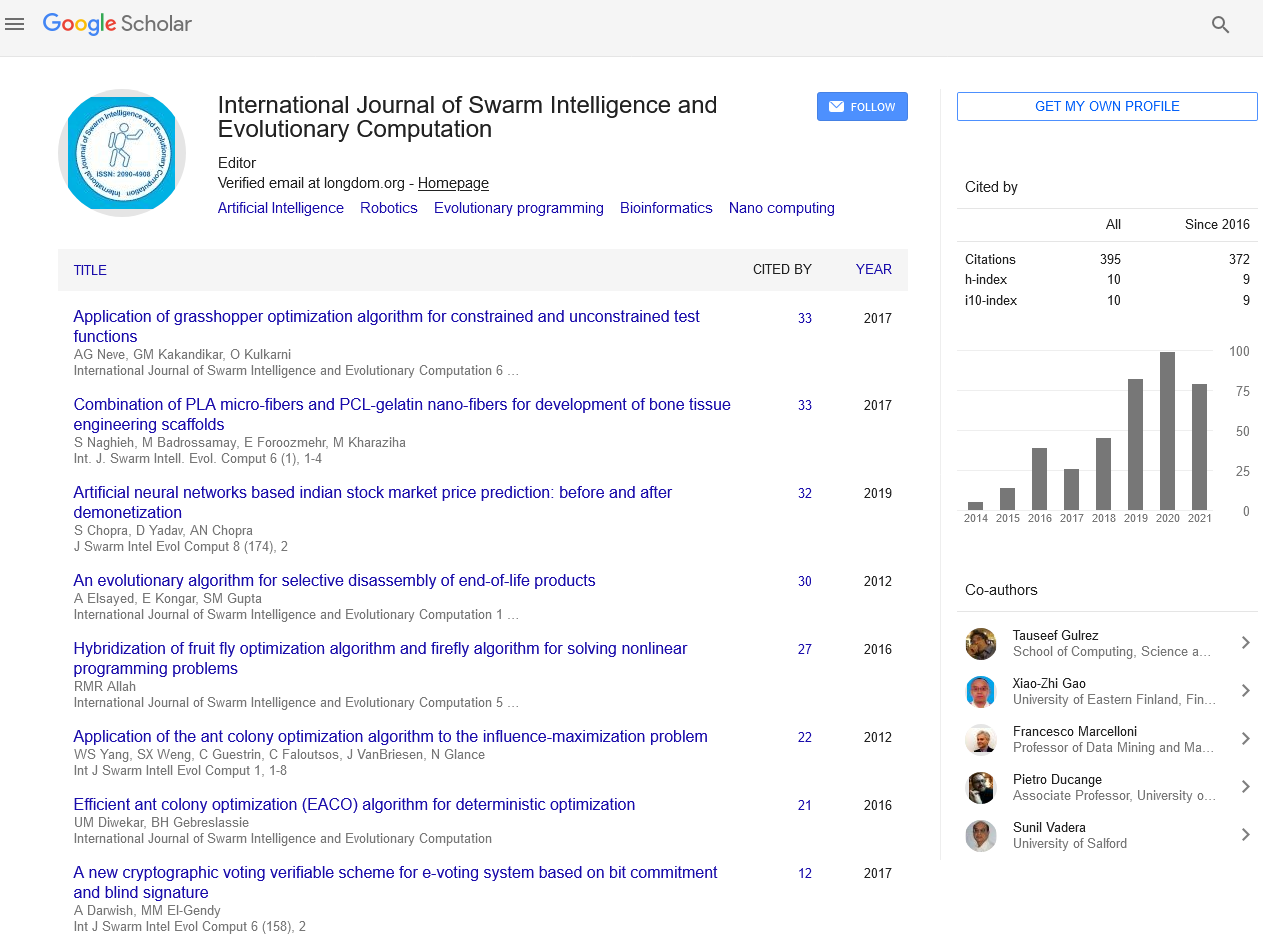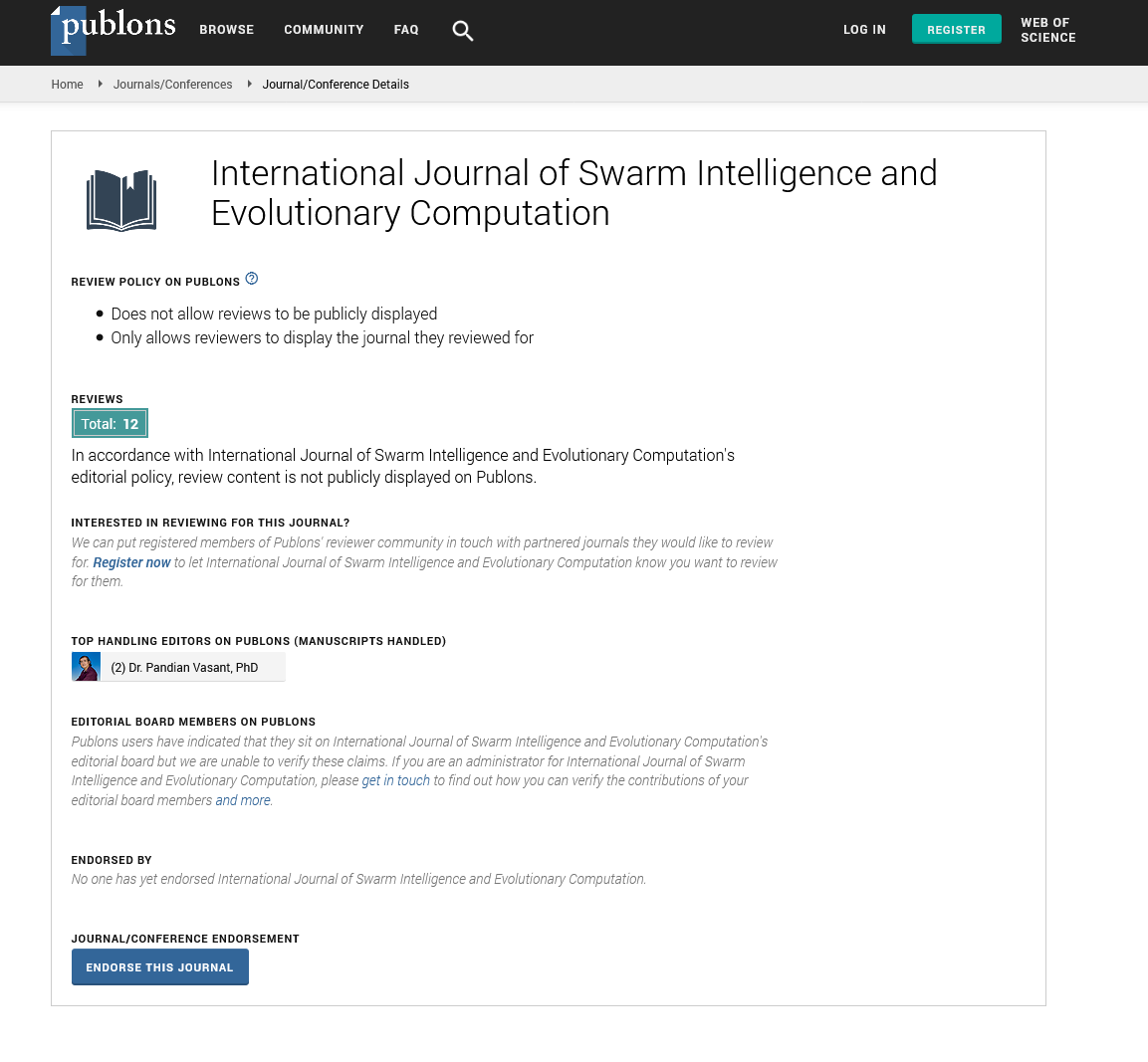Indexed In
- Genamics JournalSeek
- RefSeek
- Hamdard University
- EBSCO A-Z
- OCLC- WorldCat
- Publons
- Euro Pub
- Google Scholar
Useful Links
Share This Page
Journal Flyer

Open Access Journals
- Agri and Aquaculture
- Biochemistry
- Bioinformatics & Systems Biology
- Business & Management
- Chemistry
- Clinical Sciences
- Engineering
- Food & Nutrition
- General Science
- Genetics & Molecular Biology
- Immunology & Microbiology
- Medical Sciences
- Neuroscience & Psychology
- Nursing & Health Care
- Pharmaceutical Sciences
Perspective - (2023) Volume 12, Issue 1
Swarm Intelligence: The Power of Collective Decision Making
William Lewis*Received: 02-Jan-2023, Manuscript No. SIEC-23-20391; Editor assigned: 04-Jan-2023, Pre QC No. SIEC-23-20391 (PQ); Reviewed: 18-Jan-2023, QC No. SIEC-23-20391; Revised: 26-Jan-2023, Manuscript No. SIEC-23-20391 (R); Published: 03-Feb-2023, DOI: 10.35248/2090-4908.23.12.298
Description
Swarm intelligence is a fascinating field of study that has gained immense popularity in recent times. It is a collective behavior of decentralized, self-organized systems, which is inspired by the behavior of social insects like ants, bees, and termites. The concept of swarm intelligence emerged from the observation of social insects and their remarkable ability to work together to achieve a common goal. These insects exhibit complex behaviors and decision-making processes that are not controlled by any central authority. They rely on simple rules and local interactions to coordinate their actions and achieve collective intelligence.
Swarm intelligence has been applied in various fields, including robotics, optimization, and data analysis. The fundamental principles of swarm intelligence can be applied to solve complex problems that are beyond the capabilities of individual agents. The agents in a swarm are typically homogeneous and have limited capabilities. They rely on simple rules and local interactions to coordinate their actions and achieve the desired outcome. The swarm as a whole exhibits emergent behavior that is not present in any individual agent.
Applications of swarm intelligence
In robotics, swarm intelligence is used to develop autonomous robots that can work together to achieve a common goal. The robots can communicate with each other and adapt to changing environments to achieve the desired outcome.
In optimization, swarm intelligence is used to solve complex problems that are beyond the capabilities of traditional optimization algorithms. The swarm-based optimization algorithms are inspired by the behavior of social insects and use simple rules and local interactions to explore the search space and find the global optimum.
In data analysis, swarm intelligence is used to develop clustering algorithms that can group similar data points together. The swarm-based clustering algorithms are inspired by the behavior of social insects and use simple rules and local interactions to group the data points.
Principles of swarm intelligence
The fundamental principles of swarm intelligence are based on the behavior of social insects. These principles include:
Decentralization: The decision-making process is distributed among the agents in the swarm. There is no central control, and each agent makes decisions based on local information.
Self-Organization: The agents in the swarm organize themselves based on simple rules and local interactions. The swarm as a whole exhibits emergent behavior that is not present in any individual agent.
Adaptability: The swarm can adapt to changing environments and achieve the desired outcome.
Robustness: The swarm is robust to failures of individual agents. Even if some agents fail, the swarm as a whole can still achieve the desired outcome.
Conclusion
Swarm intelligence is a fascinating field of study that has gained immense popularity in recent times. It is based on the behavior of social insects and their remarkable ability to work together to achieve a common goal. Swarm intelligence has been applied in various fields, including robotics, optimization, and data analysis. The fundamental principles of swarm intelligence include decentralization, self-organization, adaptability, and robustness. Swarm intelligence has the potential to revolutionize the way solve complex problems and make decisions.
Citation: Lewis W (2023) Swarm Intelligence: The Power of Collective Decision Making. Int J Swarm Evol Comput. 12:298.
Copyright: © 2023 Lewis W. This is an open-access article distributed under the terms of the Creative Commons Attribution License, which permits unrestricted use, distribution, and reproduction in any medium, provided the original author and source are credited.


